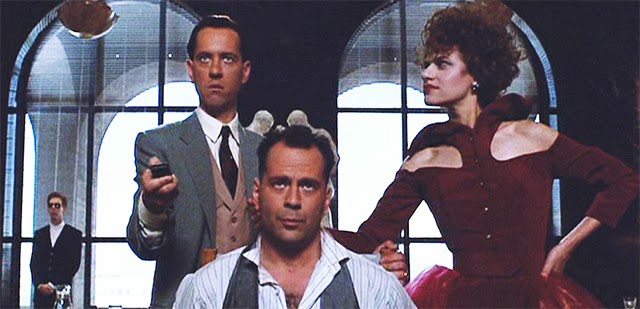
When Hudson Hawk (1991) nobody liked it. It seemed that director Michael Lehmann had squandered all of the success of Heathers (1989) on a genre pastiche that nobody wanted. Hudson Hawk was one of those films that seemed to haunt video stores without ever being rented. Tapes of Hudson Hawk just sat on the shelf collecting dust, enjoying a reputation as a “bad movie” that wasn’t worth anyone’s time. The truth of the matter is that Hudson Hawk is not as bad as everyone made it out to be.
Hudson Hawk is a movie that simply came out at the wrong time. If Hudson Hawk had been released a decade later while Charlie’s Angels (2000) was dominating the box office it would have been a hit. Like The Last Action Hero (1993), Hudson Hawk simply proved that the movie going public wasn’t ready for a post-modernist satire of action movies. The world wanted more James Camerons not Frank Tashlins.
Hudson Hawk takes the post-modern apparatus of Steven Spielberg and aims it at the campy spy parodies of the sixties like Our Man Flint (1966), Modesty Blaise (1966), The Avengers (1961-69) and Danger: Diabolik (1968) to create an adventure that is equal parts ironic and sincere; an Indiana Jones movie for the connoisseurs of modernist satires. The intertextuality of the post-modern network that is the very fabric of Hudson Hawk draws on sixties popular teen culture to create a fantasy that predicts the Austin Powers movies as well as its more serious double The Da Vinci Code.
The most important thing that Michael Lehmann brings to Hudson Hawk from the spy movies of the sixties is the lesson that, while the world of the fiction may be high camp the performances of the actors (no matter how outlandish) must remain totally un-ironic and sincere. So many films with the same general aesthetic aims as Hudson Hawk (like the Austin Powers movies) refuse to take the madcap world of their fictions seriously. Would audiences love Indiana Jones and James Bond as much as they do if the leading men weren’t totally invested in their characters?
Hudson Hawk delivers inspired cartoonish lunacy with every set piece, quirky characters, over the top bad guys, goof ball henchman, and corny quips in such rapid succession that it becomes almost overwhelming. Hudson Hawk, as an entertainment, is a work of inspired excess. One doesn’t need to be familiar with the films and shows that have influenced Hudson Hawk to enjoy its abundant superficial pleasures. The Last Action Hero bombed at the box office only to find its audience later because it accomplishes all of the same things as Hudson Hawk (though it is primarily concerned with spectacles of the eighties rather than the sixties). So perhaps it is time that we all start to appreciate Hudson Hawk a little more.
